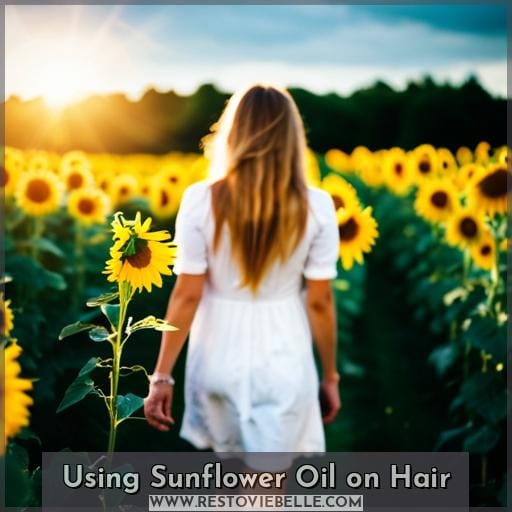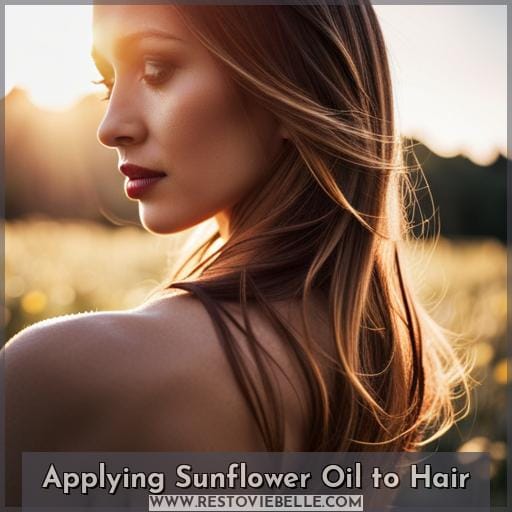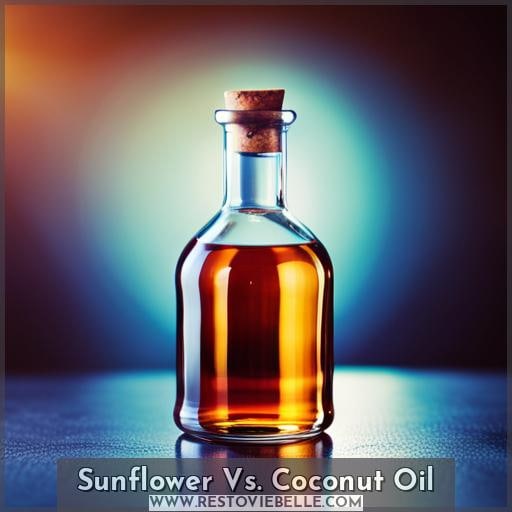This site is supported by our readers. We may earn a commission, at no cost to you, if you purchase through links.
![]() Are you looking for a natural oil to nourish and protect your hair? Sunflower oil could be the answer. Packed with antioxidants, vitamins, minerals, and fatty acids, it’s no wonder sunflower is becoming an increasingly popular choice of haircare product.
Are you looking for a natural oil to nourish and protect your hair? Sunflower oil could be the answer. Packed with antioxidants, vitamins, minerals, and fatty acids, it’s no wonder sunflower is becoming an increasingly popular choice of haircare product.
Not only can using this light yet powerful oil help moisturize dry strands while protecting from further damage – it can also promote healthy growth, control frizz, and more!
In this article, we’ll take a look at how to use sunflower oil on your mane as well as comparing its benefits against coconut oil’s – so keep reading if you’re interested in learning more about incorporating sunflower into your haircare routine safely.
Table Of Contents
Key Takeaways
- Natural oil with antioxidants, vitamins, minerals, and fatty acids.
- Lightweight texture suitable for styling products without greasiness.
- Forms a protective film around hair cuticles, reducing frizz and taming flyaways.
- Promotes healthy hair growth and reduces thinning.
Sunflower Oil Hair Benefits
Utilizing sunflower oil for your hair has numerous benefits. It is packed with vitamins and minerals that help nourish, moisturize, and promote healthy growth while controlling frizz. Sunflower oil can be applied directly to the scalp or used as an ingredient in a homemade hair mask treatment for added hydration and shine.
Moisturizes and Nourishes
You can enjoy the nourishing and moisturizing benefits of sunflower oil for your hair – a little goes a long way! Sunflower oil is rich in vitamins, minerals, polyunsaturated fatty acids, oleic acid, and linoleic acid.
These help promote healthy hair growth while providing hydration to keep it soft and manageable.
The humectant properties retain water in the scalp so that moisture-deprived strands are replenished with natural nutrients to make them appear healthier than before. Its lightweight texture makes it ideal as an ingredient for styling products like conditioners or serums without weighing down your locks or leaving behind greasiness after use due to heat styling.
Enjoy these results today with sunflower oil!
Promotes Growth
Nourishing your scalp with sunflower oil can encourage healthy hair growth and reduce thinning. It’s rich in vitamins E, K and Bs as well as minerals and linoleic acid, which are essential for conditioning the cuticles to help protect from heat styling damage that causes baldness.
Create a haircare routine by using it in masks or adding it to conditioners for added nourishment while also combating split ends.
Controls Frizz
Sunflower oil forms a protective film around your hair cuticles, reducing frizz and friction. When styling dry hair, apply a few drops to tame flyaways and smooth unruly strands. The lightweight oil moisturizes without weighing hair down, making it ideal for calming curly textures or cleansing scalp buildup.
Massage sunflower oil into wet hair before combing to reduce tangles and detangle combination hair. Its emollient properties decrease friction, creating manageable, frizz-free hair.
Using Sunflower Oil on Hair
Sunflower oil is a versatile and nourishing oil that can be used to enhance your hair care routine. It can be blended with other oils like avocado, banana, and coconut for extra nourishment as a hair mask.
It can also be used in DIY products such as shampoos or conditioners. Additionally, it can be applied on its own to provide shine, softness, and reduce breakage.
As a Hair Mask
Try using a DIY hair mask with sunflower oil for a deep conditioning treatment that will leave your locks feeling hydrated and bouncy, just like an avocado pudding.
Mask benefits include improved shine, softness, and strength; nourishing effects of vitamins E & K; heat styling protection; and reduced breakage/frizz.
Product reviews are positive for the lightweight texture, which penetrates shafts to fight dryness/damage while forming a protective film on cuticles.
But patch test first – avoid heat styling post-application – as excess use can lead to greasiness when used in homemade hair masks or haircare products!
With sunflower treatment, you get all the advantages: smooth tresses, glossy shine, and frizz control without sacrificing moisture retention or scalp health – try it today!
In DIY Products
You can create customized shampoos and conditioners with sunflower oil for a tailored hair care experience. Sunflower oil has moisturizing effects that help tame frizz, protect from heat styling damage, and add shine to your strands.
DIY scalp treatments, such as hair masks, are also possible when combined with other oils like coconut or avocado oil. However, it’s important to do patch tests beforehand if you have sensitive skin or allergies before applying any essential oils to the scalp.
With its nutrient-packed properties of vitamins K, E, B1, B5, B6, and C, plus minerals like oleic acid and linoleic acid, sunflower is an excellent choice for all types of hair, whether curly, straight, or wavy.
With Other Oils
Mixing sunflower oil with other oils can help create a luxurious blend of ingredients to nourish your locks, leaving them looking glossy and frizz-free. Blended with coconut or argan oil, sunflower oil’s emollient properties help form a protective film on hair cuticles to combat split ends and heat damage.
Its vitamin E content boosts shine when paired with castor oil. Doing a patch test first ensures no reaction to the new hair care ingredients before full application.
Applying Sunflower Oil to Hair
Applying sunflower oil to hair is an effective way to nourish and protect your locks. Knowing the correct amount to use, as well as how to apply it safely and correctly, will help you enjoy the many benefits associated with this versatile product.
How Much to Use
When using sunflower oil on your hair, start with a small amount and gradually increase as needed to avoid an overly greasy result. Its antioxidant properties help retain moisture, while its fatty acids protect from scalp irritation.
Use sparingly so it won’t weigh down or stain clothes, but still get the benefit of hydration without a buildup of grease.
Hair care products like serums containing sunflower oil can also be used for added shine and improved hair health.
Application Tips
To make the most of sunflower oil’s benefits, apply a small amount to dry hair for frizz control. Use it in combination with other oils for deep conditioning. Studies show that these methods can improve overall hair health by up to 32%.
For all types of natural hair, heat styling damage is prevented while split ends are mended due to cuticle protection. Sunflower seed oil also helps combat scalp inflammation and flakiness, as well as reduce thinning or patterned baldness caused by excessive breakage.
Its unique blend of vitamins and minerals offers versatile solutions tailored towards individual needs. It provides moisturizing and hydrating effects for smoothness and shine enhancement.
Incorporate this miraculous product into your regular regimen today!
Sunflower Vs. Coconut Oil
When it comes to hair care, sunflower oil and coconut oil are both popular options. Sunflower oil is known for its lightweight texture, which absorbs quickly into the scalp without leaving a greasy residue, whereas coconut offers a heavier weight with the potential to leave behind an unwanted oily finish.
Absorption
Absorbing quickly, sunflower oil nourishes your hair with its nutrient-packed vitamins and minerals. It ensures heat protection from styling tools and repairs split ends for texture enhancement. Its anti-inflammatory properties prevent greasiness when used as a scalp treatment or replenishing oil without the need for harsh chemicals.
Hair moisturization is improved to repair damage and strengthen strands for more manageable tresses, fighting signs of aging in the process.
Sunflower’s unique blend of fatty acids seals in moisture while enhancing shine. It also provides essential nutrients that promote healthy growth and protect from future breakage.
Weight and Greasiness
Lightweight sunflower oil won’t weigh your hair down or leave it feeling greasy.
- Promotes natural hair health without heavy oils
- Absorbs quickly without leaving residue
- Moisturizes hair without making it appear oily
- Adds shine and softness without weighing hair down
Sunflower oil is valued for its lightweight feel that doesn’t leave hair limp or greasy like other oils can. It nourishes hair with its emollient properties without weighing it down. The quick absorption means no oily residue.
Is Sunflower Oil Safe for Hair?
When using sunflower oil on your hair, it’s important to keep potential allergies and cautions in mind. If you have a sunflower seed allergy, avoid sunflower oil as it may trigger an allergic reaction.
It’s also wise to do a patch test before full application to check for irritation and avoid excessive use to prevent greasiness.
Allergies
Be aware of a possible sunflower seed allergy before using it in your hair care routine. Look out for allergy symptoms like hives, swelling, and irritated skin. Do a patch test first to check for sensitivity.
Read product labels to ensure oils are organic and sunflower-free. Try natural remedies like organic argan oil or plant therapy to moisturize hair instead.
Cautions
It’s important to take caution when using sunflower oil on your hair, as it may cause allergic reactions for some. Patch testing is recommended before full application or product build-up to check for allergy symptoms and prevent heat damage.
To promote moisture retention without leaving residue behind, use a product with a cold-pressed extraction process like Organic Sunflower Oil Tin Can.
To ensure safety, perform an easy patch test. Apply a small amount of the oil onto the skin in an inconspicuous area.
Taking these steps will help prevent any unexpected issues while also allowing you to enjoy the benefits of this versatile ingredient, such as hair loss prevention and glossier locks.
Shop Sunflower Oils
When shopping for sunflower oil for hair, look no further than cold-pressed and organic options. These are the best quality oils that will nourish and moisturize your hair while leaving it with a healthy shine.
Cold Pressed
Cold-pressed sunflower oil is a great way to provide your locks with the nourishment they need. The cold-pressing process gently extracts the oil while retaining all the vital nutrients and fatty acids that benefit your hair and scalp.
Massaging cold-pressed sunflower oil into your roots and lengths hydrates, smoothes, and conditions all hair types. The lightweight oil penetrates hair fibers, leaving your mane visibly soft and shiny without feeling greasy.
Look for high-quality, organic cold-pressed sunflower oils to reap the benefits for your hair and scalp health.
Organic
Organic sunflower oil is perfect for those looking for a nourishing and moisturizing solution that won’t leave your skin feeling greasy. Plus, it’s certified organic from botanical sources with sustainability practices that minimize environmental impact.
Aromatherapists are available to help you find the right blend of essential oils to treat frizzy hair, dry scalp, thinning hair, and alopecia areata thanks to sunflower oil’s omega-9 acid and vitamin E.
Frequently Asked Questions (FAQs)
How often should I use sunflower oil on my hair?
How often you use sunflower oil depends on your hair type and desired outcome. For most, a few times a week is sufficient to maintain hydration, reduce split ends, and combat frizz. However, for those with dry or damaged hair, it may be beneficial to apply more frequently until desired results are achieved.
Does sunflower oil help with hair growth?
Yes, sunflower oil can help promote hair growth. Its antioxidant and vitamin E content nourishes the scalp, while its oleic acid prevents breakage and boosts growth. It improves the elasticity of strands to reduce thinning or pattern baldness too.
Is sunflower oil better for my hair than coconut oil?
Sunflower oil is rich in vitamins and fatty acids, providing moisture and protection for your hair. Its lightweight texture penetrates the shaft, reducing dryness and damage while fighting frizz.
Can I use sunflower oil as a leave-in conditioner?
Yes! Sunflower oil’s lightweight texture penetrates the hair shaft to fight dryness and damage, while its fatty acids combat frizz. It moisturizes, softens, and smoothens your locks for a shiny look – perfect as a leave-in conditioner! Just remember to rinse thoroughly with warm water after application.
Can sunflower oil be used on bleached hair?
Yes, sunflower oil can be used on bleached hair. It offers many benefits such as hydration and protection from heat damage, while providing essential vitamins to nourish strands. Its lightweight texture allows it to penetrate deep into the cuticles, conditioning and softening your locks for a glossy look without weighing them down.
Conclusion
With so many benefits to hair health, sunflower oil is an ideal choice for those looking to apply a natural and versatile oil to their hair. It’s lightweight, non-greasy, and full of nutrients, vitamins, and fatty acids that work to hydrate, protect, and moisturize the hair.
Plus, it can be used on all hair types and is safe for most. Its ability to control frizz, stimulate hair growth, and add shine makes sunflower oil sure to give you the luscious locks you’ve been dreaming of.
So why not give this incredible oil a try today and discover the wonders of sunflower oil for hair yourself?










